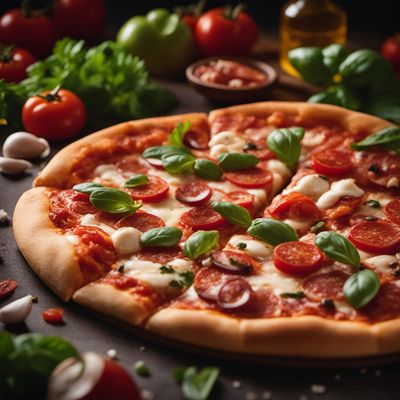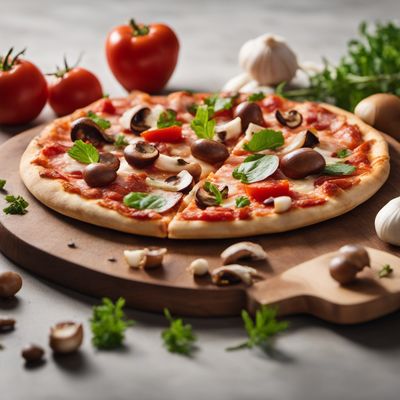
Ingredient
Pizza and similar with cheese, meat, and vegetables
Savory Delights: Exploring the World of Pizza
Pizza is typically made with a dough base topped with tomato sauce, cheese, meat, and vegetables. The crust can range from thin and crispy to thick and chewy, while the toppings offer a burst of flavors and textures. The cheese adds a creamy richness, the meat provides savory notes, and the vegetables contribute freshness and crunch. Whether enjoyed as a classic Margherita or a loaded meat lover's delight, pizza is a crowd-pleasing favorite.
Origins and history
The origins of pizza can be traced back to ancient civilizations such as the Greeks, Egyptians, and Persians, who all had their own versions of flatbreads topped with various ingredients. However, it was in Naples, Italy, during the late 18th century that the modern pizza as we know it today began to take shape. Originally a simple street food for the working class, pizza gained popularity and eventually spread across the globe, becoming a staple in many cuisines.
Nutritional information
Pizza can be a good source of carbohydrates, protein, and essential nutrients depending on the choice of ingredients. However, it can also be high in calories, saturated fat, and sodium, especially when loaded with excessive cheese and processed meats.
Allergens
Gluten, dairy, and meat are common allergens associated with pizza. Additionally, individuals with tomato or vegetable allergies should be cautious when consuming certain pizza toppings.
How to select
When selecting a pizza, look for a well-risen crust that is golden brown and evenly cooked. The cheese should be melted and bubbly, while the meat and vegetables should be fresh and flavorful. Avoid pizzas with soggy or undercooked crusts, burnt toppings, or ingredients that appear spoiled.
Storage recommendations
To maintain the freshness of leftover pizza, store it in an airtight container in the refrigerator for up to 3-4 days. For longer storage, wrap individual slices in plastic wrap and freeze them. When ready to enjoy, thaw the frozen slices in the refrigerator and reheat in the oven or microwave.
How to produce
Producing a homemade pizza requires basic cooking skills and a few key ingredients such as flour, yeast, water, salt, olive oil, tomato sauce, cheese, meat, and vegetables. With the right recipe and techniques, anyone can create a delicious pizza in their own kitchen.
Preparation tips
To prepare a pizza, preheat the oven to a high temperature and roll out the dough into the desired shape. Spread a thin layer of tomato sauce over the dough, leaving a border for the crust. Sprinkle grated cheese evenly over the sauce, followed by the desired toppings. Bake the pizza until the crust is golden brown and the cheese is melted and bubbly. Serve hot and enjoy!
Culinary uses
Pizza is incredibly versatile and can be customized with a wide range of ingredients. It is commonly enjoyed with classic toppings such as pepperoni, mushrooms, onions, bell peppers, and olives. However, the possibilities are endless, and one can experiment with various cheeses, meats, and vegetables to create unique flavor combinations. Pizza is a staple in Italian cuisine and has also been adapted and embraced by cultures around the world, resulting in countless regional variations and fusion creations.
Availability
Pizza is widely available in pizzerias, restaurants, and fast-food chains globally. It is a popular dish in countries such as Italy, the United States, Brazil, Australia, and the United Kingdom.
More ingredients from this category

Pizza and similar with cheese, and vegetables and fruits
The Perfect Medley: Unveiling the Harmonious Blend of Cheese, Vegetables, and Fruits in Pizza and Similar Creations

Pizza and similar with cheese, meat, and mushrooms
Savory Delights: Exploring the World of Cheesy, Meaty, and Mushroomy Pizzas

Pizza and similar with meat, and vegetables
Savory Delights: Exploring the World of Meat and Vegetable Pizzas

Pizza and similar with cheese, and vegetables
The Classic Combination of Cheese and Vegetables

Pizza and similar with cheese, meat, mushrooms, and vegetables
Savory Medley: Exploring the World of Pizza and its Tantalizing Toppings

Pizza and similar with cheese, and mushrooms
The Perfect Combination: Cheese and Mushrooms on a Pizza

Pizza and similar with processed meat topping
Savory Delights: Exploring the World of Meat-Topped Pizzas

Pizza and similar with cheese topping
Cheesy Delights: Pizza and More

Pizza and similar with fish/seafood topping
Oceanic Delights

Pizza and similar with vegetable topping
Veggie Delight